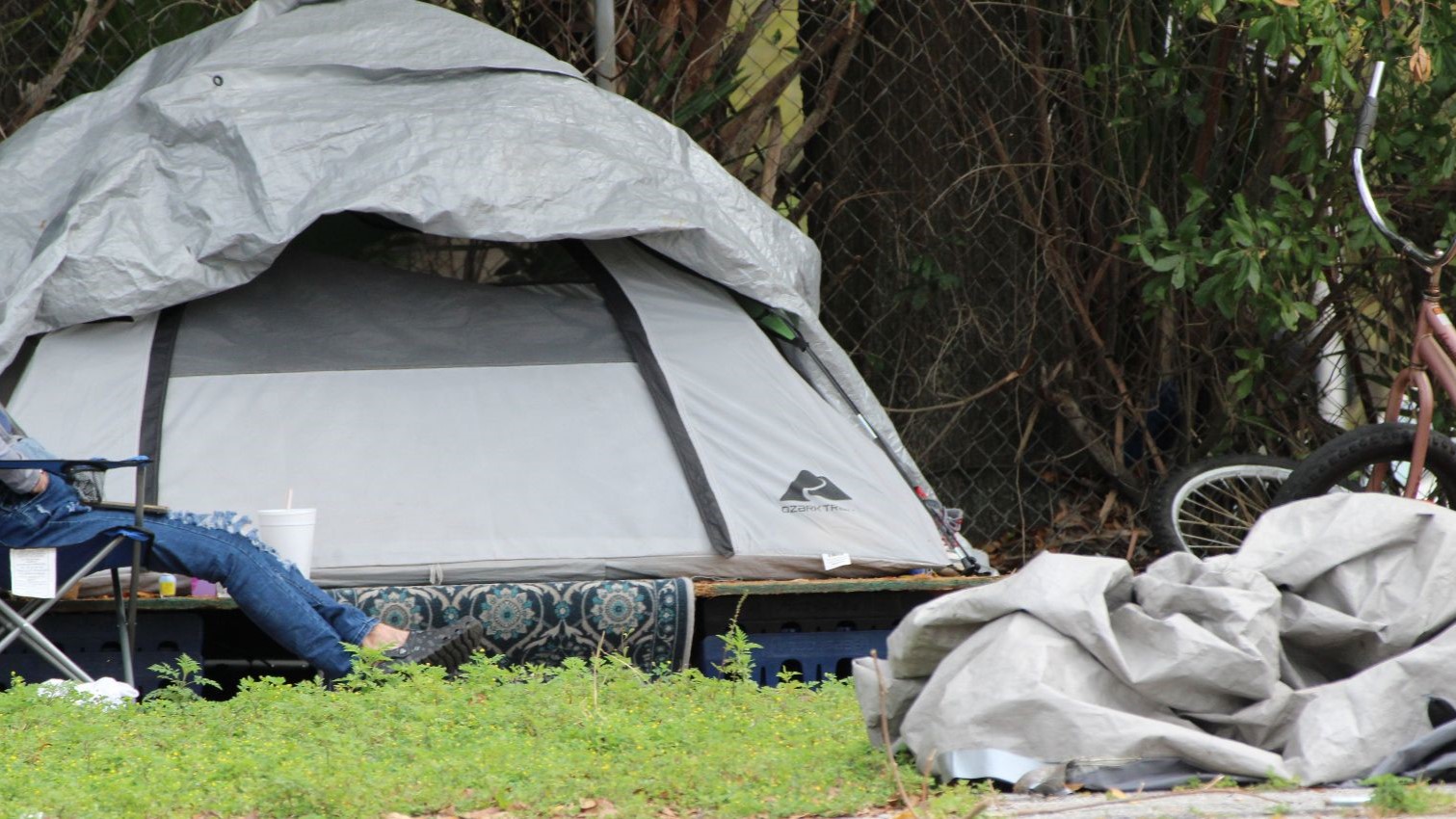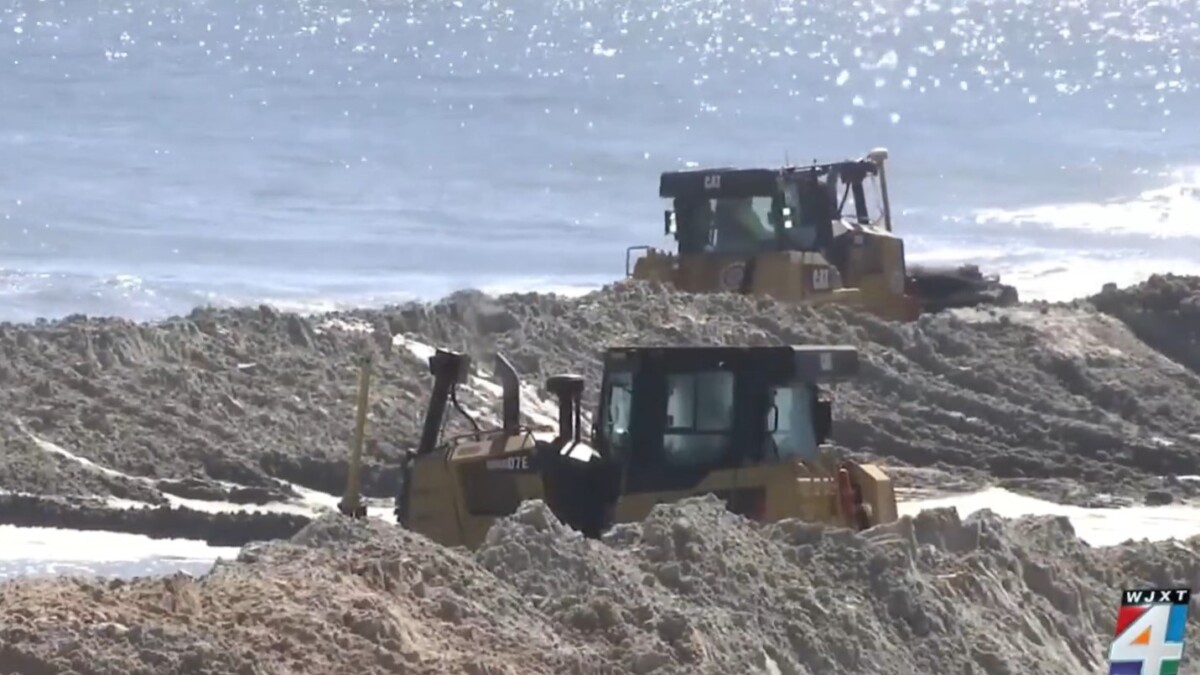Jacksonville Mayor Donna Deegan says her administration has been working on homelessness and affordable housing solutions, but a new law signed by Gov. Ron DeSantis complicates things.
The new law, sponsored by Republican Rep. Sam Garrison of Fleming Island, bans homeless people from camping on public streets and in public parks. It also requires cities to provide police-monitored facilities where homeless people can stay. The state does not provide money to meet the requirements.
“To me it’s very hard to ask people to go someplace unless you have a place for all of them to go,” Deegan said Thursday on First Coast Connect on WJCT 89.9. “And so that’s what we have to really focus on. We’re going to have to focus on how do we create that? How will we fund it?
“This puts this front and center for us. We have to comply with this with this new law, and we will. But to me the best solution is to find more housing for people. And that’s what we’re going to try to do.”
Last year, Jacksonville counted about 1,200 unhoused people in the city. A count this year found that the number of unsheltered people had increased by 43% compared with 2023. Dawn Gilman, CEO of Changing Homelessness, said the increase is one of the largest her organization has seen in recent years.
Gilman said she has mixed feelings about the bill as it relates to the goals of her organization. She said she feels the measure is a good starting point to get people talking about solutions to homelessness, but the bill doesn’t address the root causes of the issue like loss of income or an unexpected medical bill, she said.
Among possible solutions, Deegan pointed to a new city program to help first-time homebuyers with down payments.
She noted that the new state law is an unfunded mandate, so “it is something that we will have to continue to get creative around. But at the end of the day, these are not issues that we have not already been working on.
“Look, it is an issue we have to deal with,” Deegan said. “People don’t feel safe when they’re walking around the streets. And there’s a lot of folks that are on the streets, and we want those people to have places to live.”
The new law will take effect in October. DeSantis said the measure (HB 1365) will keep sidewalks from becoming “tent cities” and “ensure that Florida streets are clean and that Florida streets are safe for our residents.”
Democrats and homeless advocates who opposed the bill contended it would increase local-government costs and drive homeless people into wooded areas.
But DeSantis said the bill “is the absolute right balance” of providing safety while addressing issues facing people who have fallen on “hard times.”
“I don’t think there’s any other way you could approach it and expect to have a result different than what’s happened in places like San Francisco and New York City,” DeSantis said.
The bill will prevent cities and counties, from allowing people to sleep on public property, including at public buildings and in public rights of way. It would allow local governments to designate certain property for sleeping or camping if the sites meet standards set by the Florida Department of Children and Families.
Such areas, which could be used only for one year, would have to include access to such things as restrooms and running water, have security and be deemed alcohol- and drug-free. Also, the sites could not harm values of nearby properties or safety.
The law also will give legal standing to residents and business owners to file civil lawsuits against local governments that allow sleeping or camping on public property.
Rep. Anna Eskamani, D-Orlando, said the measure “targets individuals who are homeless and creates a scenario for local governments, where the only option — if they can’t meet the demands of the Legislature — is to potentially criminalize homelessness.”
“So, not only are we not offering clear solutions,” Eskamani said. “We’re actually making a bad situation worse and not helping people get out of that economic instability that they’re facing.”
Jeff Brandes, a former Republican senator who founded the nonprofit Florida Policy Project think tank, cautioned that the measure provides no funding for local governments.
“Nobody kind of said, ‘What happens next’ and followed the natural progression of that question,” Brandes said March 8 during an appearance on the “Florida This Week” program on WEDU in the Tampa Bay area. “I think when you get to the end of that, you realize people are still going to be living on the streets. Either the cities are not going to be able to do that or the jails are going to be full. And you’re going to hear from the sheriffs that you’re going to need to expand the jails.”
An annual report from the Florida Council on Homelessness released last June said “over the past five years, Florida has seen a 9% increase in the rate of Floridians experiencing ‘literal homelessness.’”
While acknowledging the accuracy of recent homeless counts were limited because of COVID-19 restrictions, the report pointed to issues such as rising housing costs.
“According to an analysis conducted by the Government Accountability Office, for every $100 monthly median rent increase there is a 9 percent increase in homelessness,” the council report said. “Therefore, Florida’s unprecedented increases in rent rates will have a significant impact on the rate of homelessness.”
DeSantis has repeatedly compared Florida’s handling of homeless people to other parts of the country.
During his State of the State address Jan. 9, DeSantis said, “Cities throughout the land have decayed: Washington, D.C., has experienced its deadliest year in more than two decades, and San Francisco has fallen into a ‘doom loop’ whereby crime, homelessness and drug abuse have eviscerated the quality of life.”
He held a news conference Feb. 5 in Miami Beach to support the homeless restrictions and stood behind a podium that said: “Don’t Allow Florida to become San Francisco.”
Garrison, the Fleming Island legislator, appeared at Wednesday’s bill-signing with DeSantis. He described “the great cities that we grew up idolizing” being “brought to their knees,” where families aren’t comfortable to have their kids walk the streets, and business owners close shop “because it’s just not safe.”
The House voted 82-26 to pass the bill March 1, and the Senate followed with a 27-12 vote on March 5.







